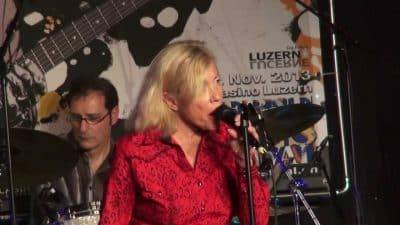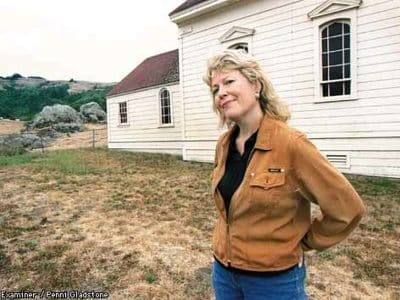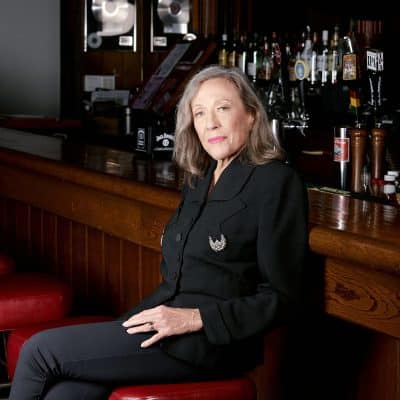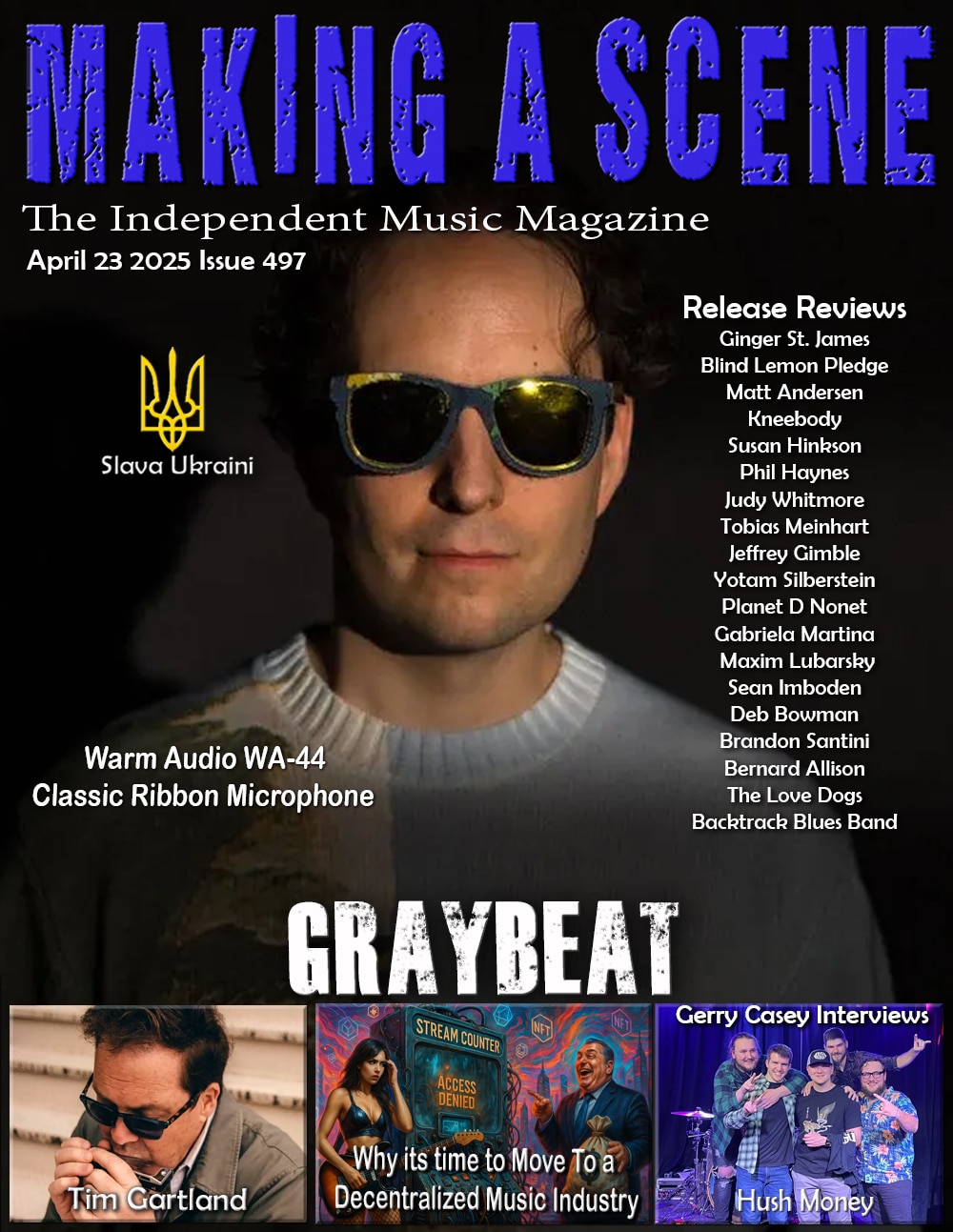Angela Strehli is Making a Scene

HOME PAGE
|
|
 |
 |
 |
 |
 |
 |
 |
 |
 |
 |
 |
Making a Scene Presents an Interview with Angela Strehli
 Husky-voiced blues and soul singer Angela Strehli has often been called the “First Lady of Texas Blues.” Indeed, her contributions both on and off stage have done much to propel the Austin blues scene toward international prominence. Whether recording with such friends as Marcia Ball, Lou Ann Barton, Sue Foley, and Stevie Ray Vaughan, or helping mastermind policies behind the success of Antone’s—the legendary Austin blues club—she has performed with unerring taste and verve. For a major modern blues figure, the sultry blonde has not recorded prolifically, preferring to treat each album as a special event. However, the albums she has chosen to share with the public are remarkably entertaining and expressive slices of gut-bucket blues revival and scintillating uptown soul.
Husky-voiced blues and soul singer Angela Strehli has often been called the “First Lady of Texas Blues.” Indeed, her contributions both on and off stage have done much to propel the Austin blues scene toward international prominence. Whether recording with such friends as Marcia Ball, Lou Ann Barton, Sue Foley, and Stevie Ray Vaughan, or helping mastermind policies behind the success of Antone’s—the legendary Austin blues club—she has performed with unerring taste and verve. For a major modern blues figure, the sultry blonde has not recorded prolifically, preferring to treat each album as a special event. However, the albums she has chosen to share with the public are remarkably entertaining and expressive slices of gut-bucket blues revival and scintillating uptown soul.
A Blues Singer with a College Degree
Born in Lubbock, Texas, on November 22, 1945, Strehli grew up in a household that valued education; her father was a college professor, and her older brother, Al, was later a composer of classical chorales and a proficient Spanish folk guitar player. Former neighbor Jimmie Dale Gilmore recalled on the Virtualubbock website that the whole family studied Argentinian folk music and spent a lot of time in South America, where Strehli’s mother was born.
 Listening to various West Texas and Mexican border radio stations helped young Angela develop a keen appetite for the blues. “Angela and I were interested in folk music,” Gilmore told Virtualubbock, “and we were in a folk music club together. But she specifically was into the blues and became more and more obsessed with the blues and became just extremely knowledgeable about it.”
Listening to various West Texas and Mexican border radio stations helped young Angela develop a keen appetite for the blues. “Angela and I were interested in folk music,” Gilmore told Virtualubbock, “and we were in a folk music club together. But she specifically was into the blues and became more and more obsessed with the blues and became just extremely knowledgeable about it.”
Always a good hard-working student, Strehli attended Carlton, a small, highly respected liberal arts college in Northfield, Minnesota, but after two years she missed Texas and the blues, and returned to finish up at the University of Texas, where she earned a degree in sociology and psychology with a minor in Spanish. After serving an eye-opening stint as a social worker in San Antonio, Strehli stumbled upon an opportunity that changed her life. “I had an opportunity to go to Chicago as a representative of the student YWCA,” she told Contemporary Musicians. “So, I would go to the conventions during the daytime and … then at night go out to the blues clubs … and down to the Southside of Chicago. So, I got a nice big heavy taste of blues there, and that was wonderful and I still managed to finish college.”
Made Her Mark at Antone’s
 Although she occasionally worked as a substitute teacher, Strehli couldn’t resist the lure of the growing Austin music scene. She joined a local contingent called the Fabulous Rockets, singing a mix of R&B, soul, and blues at local clubs and parties. Hoping to make it big, the band changed its name to Sunnyland Special and drove out to Los Angeles. Strehli recalled, “I worked at the Troubadour and the Ash Grove and did all right musically, but I was not ready to record and I knew it. I’m glad I wasn’t pressured into doing it.”
Although she occasionally worked as a substitute teacher, Strehli couldn’t resist the lure of the growing Austin music scene. She joined a local contingent called the Fabulous Rockets, singing a mix of R&B, soul, and blues at local clubs and parties. Hoping to make it big, the band changed its name to Sunnyland Special and drove out to Los Angeles. Strehli recalled, “I worked at the Troubadour and the Ash Grove and did all right musically, but I was not ready to record and I knew it. I’m glad I wasn’t pressured into doing it.”
After returning to Austin, Strehli sang with a local soul band called James Polk and the Brothers. She remembered, “At one point it was a big revue and just about all black people. That went for a couple of years—it was a weekend band.” Bluesman W.C. Clark had also been part of that revue. When it wound down, he asked Strehli to start a new band with him called Southern Feeling. Strehli recalled, “That was really a neat band because it had two front people—W.C. and myself. So, we worked in Austin for at least two or three years. It was a very popular band. By that time, there were a couple of neat places to play, but strictly for blues. … That’s when Clifford Antone got the idea to start a club and invite the masters, so people—especially students—would be exposed to real blues.”
Antone was looking for assistance in setting up the club, and Strehli took the opportunity to help out. “We opened this place and I just did everything from being a stage manager and making sure the artists were comfortable, to doing a little sound in an emergency, and was on the other side of the picture from being in a band. At the same time, I would sit in with one of my heroes and meet them. It was just a wonderful thing.”
Despite its popularity with local college students, keeping the club running smoothly was difficult during those early years. “Strehli helped me through so much of this,” Antone told the Austin Chronicle. “Her brains helped everything.” It was Strehli’s idea to begin taping some of the shows featuring legendary bluesmen, particularly those who no longer had a label. She also supported young talent, most notably a young guitarist named Stevie Ray Vaughan.
“Stevie was a perfect example of someone who took good advantage of the scene at Antone’s,” she observed. “When Stevie first came to town, he had a couple of little rock bands, but he was really captured by blues, as his older brother had been. … He decided that he should learn how to sing. He asked me to help him get started singing. … I just said, ‘Stevie, pick a song that you love and just try it.'” Vaughan chose a tune from Strehli’s onstage playlist, “Flood in Texas,” and it was the song that inspired John Hammond at Columbia to sign him to a major label contract. In 1984 Vaughan would repay Strehli’s professional kindness by inviting her to sing at his historic Carnegie Hall concert.
Strehli began taking tentative steps toward her first album in 1986 with the EP Stranger Blues. The following year she released her first full-length solo album, Soul Shake. Mixing such powerhouse standards as Elmore James’s “It Hurts Me Too,” J.B. Hutto’s “20% Alcohol,” and Eddie Taylor’s “Bigtown Playboy” with her self-penned “Take it From Me” and “You Sweetness,” she crafted a fine debut album. However, despite a guest appearance on the Austin City Limits TV program and a tour with Doug Sahm, the poorly distributed Soul Shake was not a big seller.
Recorded with Marcia Ball and Lou Ann Barton
 By far the best-known recording project Strehli did at Antone’s was the 1990 Dreams Come True album with her Austin scene contemporaries Marcia Ball and Lou Ann Barton. “It was really a happy circumstance,” Strehli said. “Clifford was always trying to get us to do shows together and that was a way we could at least hear each other. … So, we went into the studio and made a little demo of ‘A Fool in Love’ and I think a Sarah Brown song. … Sure enough, our voices blended together. … That was the inspiration point to make that record.”
By far the best-known recording project Strehli did at Antone’s was the 1990 Dreams Come True album with her Austin scene contemporaries Marcia Ball and Lou Ann Barton. “It was really a happy circumstance,” Strehli said. “Clifford was always trying to get us to do shows together and that was a way we could at least hear each other. … So, we went into the studio and made a little demo of ‘A Fool in Love’ and I think a Sarah Brown song. … Sure enough, our voices blended together. … That was the inspiration point to make that record.”
Dreams Come True featured all three artists at the peak of their respective abilities, and for a hard-to-find independent release, it proved remarkably popular. “When we would do shows together,” reminisced Strehli, “we’d come out and be our own selves, establish our own identities, and then do our stuff together. It was the most fun I’ve had singing. It’s no mystery to me why audiences loved it. … I would have done it forever.”
Moved to California
After years of devoted service to both Antone’s club and its record label, Strehli left after 1993. She resurfaced on Rounder with her urban soul-drenched album Blonde and Blue. “Antone’s was always struggling and just not able to put out that record,” the artist recalled. “I had been lucky enough to make my records and then offer them to record labels.” It had been seven years since her previous full-length solo outing, but she never worried about productivity for productivity’s sake. “I just thought that recording was such a privilege that I shouldn’t abuse it,” she explained. “I wanted to make sure that I had a group of songs that I thought were worthy.”
Far more eclectic was 1998’s Deja Blue, which ran the gamut from soul and jazz to prewar juke blues and a clever Jimmy Reed tribute. The album was her best since Soul Shake, but outside of her most loyal fans, few heard it, as two months later the House of Blues label folded.
By then, Strehli was not completely dependent on the music industry to sustain her. She had married Bob Brown, the former manager for Huey Lewis and the News, and she moved out of her beloved Austin to Marin County, California. For a few years she flew into Texas to work with her old band, before deciding to scale back her tour schedule and find California musicians to back her. By 2006 much of her time was spent helping her husband run a high class roadhouse called Rancho Nicasio, where she booked acts and occasionally performed.
Strehli kept her hand in the recording industry by making guest appearances on albums starring Maria Muldaur and Pinetop Perkins, and released a live album to sell off the stage at shows in 2001. She finally returned in 2005 with the gospel-oriented M.C. Records release Blue Highway, which boasted guest appearances from Marcia Ball, Maria Muldaur, and former boxer-turned-soul-singer Paul Thon. At age 60, her voice is as good as ever, although most of her self-penned ditties, such as “Austin’s Home of the Blues” and the Stevie Ray Vaughan tribute “SRV,” revel in personal nostalgia. Even the title track harkens back to her shared triumph with Ball and Barton.
However, this does not seem to be a sign that Strehli is planning to close down her career anytime soon. “When it gets right down to it,” she stated, “what really thrills me the most is just singing the most low down blues that there is. If I’m doing an Elmore James song, I’m just completely fulfilled as a singer. I feel this thing that I first felt when I first heard blues.”
 |  Spotify |  Deezer | Breaker |
 Pocket Cast |  Radio Public |  Stitcher |  TuneIn |
 IHeart Radio |  Mixcloud |  PlayerFM |  Amazon |
 Jiosaavn |  Gaana | Vurbl |  Audius |
Reason.Fm | |||
Find our Podcasts on these outlets
Buy Us a Cup of Coffee!
Join the movement in supporting Making a Scene, the premier independent resource for both emerging musicians and the dedicated fans who champion them.
We showcase this vibrant community that celebrates the raw talent and creative spirit driving the music industry forward. From insightful articles and in-depth interviews to exclusive content and insider tips, Making a Scene empowers artists to thrive and fans to discover their next favorite sound.
Together, let’s amplify the voices of independent musicians and forge unforgettable connections through the power of music
Make a one-time donation
Make a monthly donation
Make a yearly donation
Buy us a cup of Coffee!
Or enter a custom amount
Your contribution is appreciated.
Your contribution is appreciated.
Your contribution is appreciated.
DonateDonate monthlyDonate yearlyYou can donate directly through Paypal!
Subscribe to Our Newsletter
Discover more from Making A Scene!
Subscribe to get the latest posts sent to your email.
















































